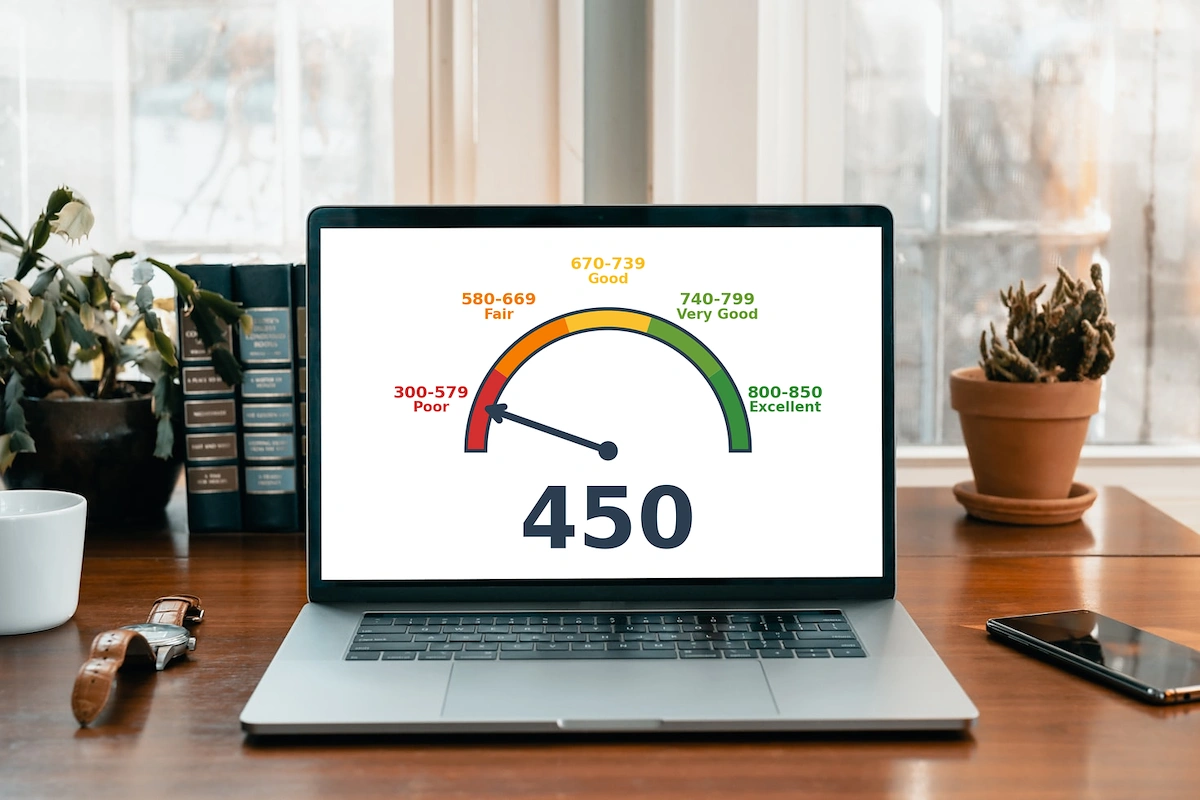
Kudos has partnered with CardRatings and Red Ventures for our coverage of credit card products. Kudos, CardRatings, and Red Ventures may receive a commission from card issuers. Kudos may receive commission from card issuers. Some of the card offers that appear on Kudos are from advertisers and may impact how and where card products appear on the site. Kudos tries to include as many card companies and offers as we are aware of, including offers from issuers that don't pay us, but we may not cover all card companies or all available card offers. You don't have to use our links, but we're grateful when you do!
450 Credit score: What You Need to Know in 2026
July 1, 2025


TL;DR
A 450 credit score is a starting point that provides a clear path for improvement. This score falls into the "Poor" range according to the FICO model, signaling an opportunity to build a stronger credit history.
What Does a 450 Credit Score Mean?
A credit score of 450 places you squarely in the "poor" credit range according to the FICO scoring model, which runs from 300 to 850. This score signals to lenders that you are a high-risk borrower, which can significantly impact your financial life. You may face outright rejections for new credit cards or loans. If you are approved, it will likely be for products with very high interest rates and unfavorable terms, making borrowing much more expensive.
While a 450 score presents considerable challenges, it's not a permanent financial sentence. It reflects past credit difficulties, but it also represents a starting point for rebuilding. With time and consistent positive financial habits, it is possible to improve your credit standing and unlock better financial opportunities in the future.
Who Has a 450 Credit Score?
While age isn't a direct factor in calculating your credit score, there is a clear trend of scores increasing over time. A 2023 generational breakdown from Experian shows how average FICO scores typically rise with age:
- Generation Z (ages 18-26): 680
- Millennials (ages 27-42): 690
- Generation X (ages 43-58): 709
- Baby Boomers (ages 59-77): 745
- The Silent Generation (ages 78+): 760
Credit Cards With a 450 Credit Score
A credit score of 450 falls into the "poor" credit range, signaling to lenders that you may be a high-risk borrower. Consequently, you'll likely face significant challenges when applying for most traditional credit cards, with many issuers denying your application outright. Even if you are approved, it will probably be for a secured card or an unsecured card with high fees, a low credit limit, and a steep interest rate.
Kudos offers tools like the Explore Tool, which uses a quiz to understand your financial goals, and the Dream Wallet, which analyzes your spending to provide tailored suggestions. These features help you find a suitable card by offering personalized recommendations and providing insights into how applying for a new card may impact your credit score.
Auto Loans and a 450 Credit Score
A 450 credit score places you in the deep subprime category, which can make securing an auto loan challenging. Lenders view this score as high-risk, often resulting in significantly higher interest rates and less favorable loan terms.
- Super-prime (781-850): 5.25% for new cars, 7.13% for used cars
- Prime (661-780): 6.87% for new cars, 9.36% for used cars
- Non-prime (601-660): 9.83% for new cars, 13.92% for used cars
- Subprime (501-600): 13.18% for new cars, 18.86% for used cars
- Deep subprime (300-500): 15.77% for new cars and 21.55% for used cars, according to a Q2 2025 market analysis.
Mortgages at a 450 Credit Score
Securing a mortgage with a 450 credit score is exceptionally difficult, as it falls below the minimum threshold for most lenders. Mainstream options like conventional, VA, and USDA loans are generally unavailable. While FHA loans are more lenient, they typically require a score of at least 500. In practice, very few mortgages are approved for borrowers with scores under 600.
If you find a specialty lender, expect severe terms. A 450 score results in much higher interest rates and fees. Lenders will also mandate a large down payment—at least 10% for an FHA loan—and conduct a strict manual underwriting process, scrutinizing your entire financial profile.
What's in a Credit Score?
Understanding your credit score can feel like trying to solve a complex puzzle, as it's a blend of several key financial habits. The most common factors that determine your score include:
- Your payment history tracks whether you have paid past credit accounts on time.
- Credit utilization is the percentage of your available credit that you are currently using.
- The length of your credit history considers the age of your oldest account and the average age of all your accounts.
- Credit mix refers to the variety of credit products you have, such as credit cards, retail accounts, and loans.
- New credit inquiries and recently opened accounts can also temporarily impact your score.
How to Improve Your 450 Credit Score
While a 450 credit score can feel limiting, it is not a permanent financial sentence, and there are proven methods to improve your creditworthiness over time. Consistent, positive financial habits can lead to meaningful changes within just a few months. Here are four actions you can take to begin rebuilding your credit:
- Monitor your credit reports. Errors on your credit report can unfairly lower your score, so disputing them is a critical first step toward recovery. Correcting inaccuracies can provide a significant and relatively quick boost to a score in the poor range.
- Establish automatic bill payments. Your payment history is the single most important factor in your credit score, and a 450 score likely reflects past-due accounts. Setting up automatic payments ensures you never miss a due date again, which stops your score from dropping further and starts building a positive track record.
- Apply for a secured credit card. A secured card is designed for individuals with damaged credit and requires a small security deposit, making it easier to get approved. Using it responsibly for small purchases and paying it off each month establishes a new line of positive payment history that gets reported to the major credit bureaus.
- Reduce your credit utilization ratio. This ratio measures how much of your available credit you're using, and keeping it low is crucial. For a low score, paying down existing balances shows lenders you can manage debt responsibly and can directly improve your score.
Kudos can act as your financial companion to help you manage your cards and monitor your progress as you build better credit.
Unlock your extra benefits when you become a Kudos member

Turn your online shopping into even more rewards

Join over 400,000 members simplifying their finances

Editorial Disclosure: Opinions expressed here are those of Kudos alone, not those of any bank, credit card issuer, hotel, airline, or other entity. This content has not been reviewed, approved or otherwise endorsed by any of the entities included within the post.



































.webp)







